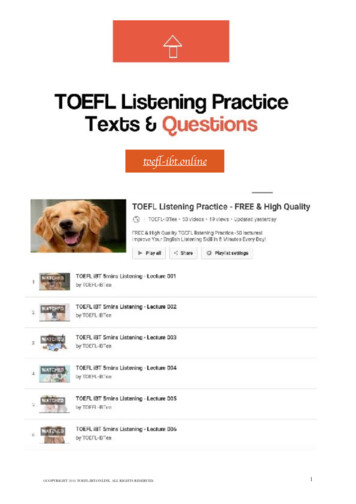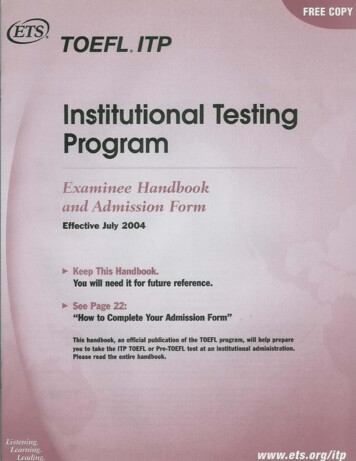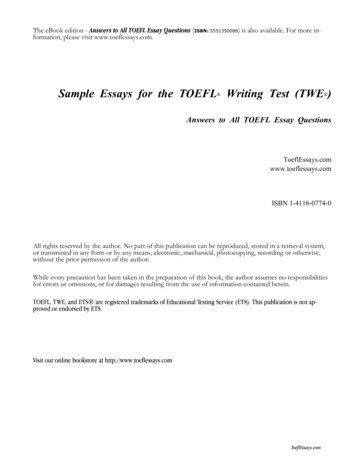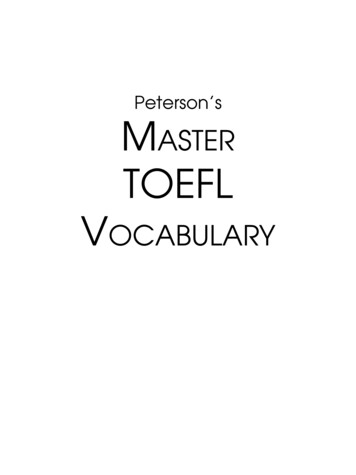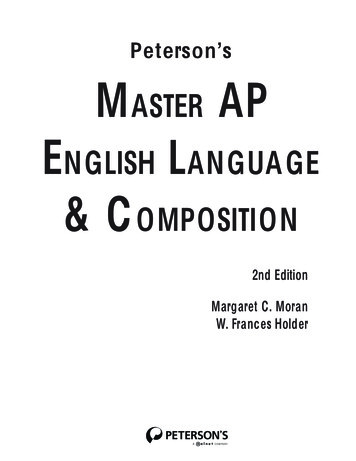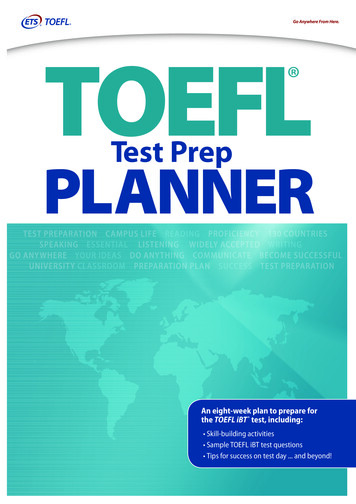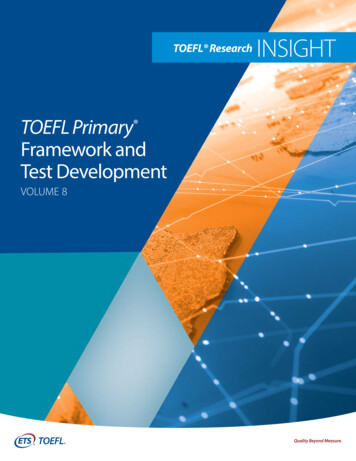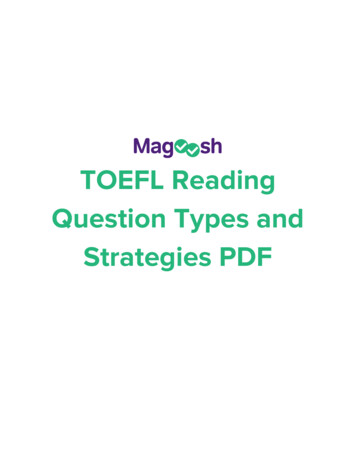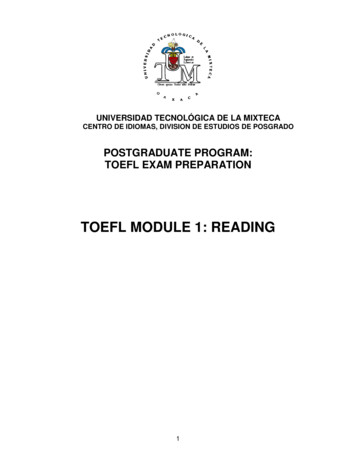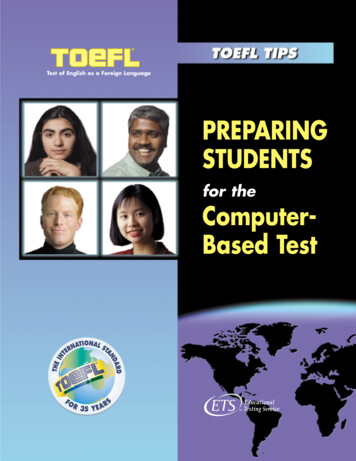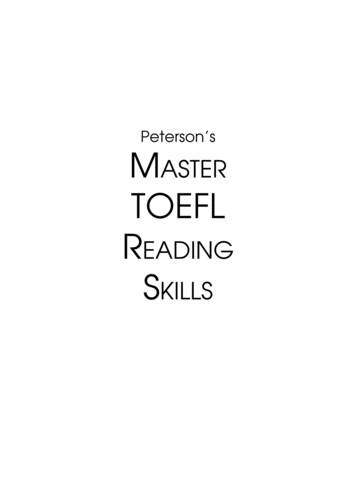
Transcription
Peterson’sMASTERTOEFLREADINGSKILLS
About Peterson’sPeterson’s (www.petersons.com) is a leading provider of education information and advice, with books andonline resources focusing on education search, test preparation, and financial aid. Its Web site offers searchabledatabases and interactive tools for contacting educational institutions, online practice tests and instruction, andplanning tools for securing financial aid. Peterson’s serves 110 million education consumers annually.For more information, contact Thomson Peterson’s, 2000 Lenox Drive, Lawrenceville, NJ 08648; 800-338-3282;or find us on the World Wide Web at: www.petersons.com/about. 2007 Thomson Peterson’s, a part of The Thomson CorporationThomson Learning is a trademark used herein under license.Portions of this book were previously published as Reading and Vocabulary Workbook for the TOEFL ExamEditor: Wallie Hammond; Production Editor: Bernadette Webster; Manufacturing Manager: Ivona SkibickiALL RIGHTS RESERVED. No part of this work covered by the copyright herein may be reproduced or usedin any form or by any means—graphic, electronic, or mechanical, including photocopying, recording, taping,Web distribution, or information storage and retrieval systems—without the prior written permission of thepublisher.For permission to use material from this text or product, submit a request online at http://www.thomsonrights.com.Any additional questions about permissions can be submitted by email to thomsonrights@thomson.com.ISBN-13: 978-0-7689-2327-8ISBN-10: 0-7689-2327-1Printed in the United States of America10 9 8 7 6 5 4 3 2 1 06 05 04
Petersons.com/publishingCheck out our Web site at www.petersons.com/publishing to see if there is any new informationregarding the test and any revisions or corrections to the content of this book. We’ve made surethe information in this book is accurate and up-to-date; however, the test format or content mayhave changed since the time of publication.
OTHER TITLES IN SERIES:Peterson’s Master TOEFL VocabularyPeterson’s Master TOEFL Writing Skills
Contents Before You Begin . viiHow This Book Is Organized . viiSpecial Study Features . viiYou’re Well on Your Way to Success . viiiGive Us Your Feedback . viiiTop 10 Strategies to Raise Your Score . ixPART I TOEFL READING BASICSChapter 1: All About TOEFL Reading . 3What Does the Reading Section Contain and How Long Does It Last? . 3To Read or Not To Read . 4Summing It Up . 14PART II DIAGNOSING STRENGTHS AND WEAKNESSESChapter 2: Practice Test 1: Diagnostic . 19PART III TOEFL READING REVIEWChapter 3: Developing Reading Comprehension Skills . 33Finding Main Ideas and Supporting Details . 33Skimming for Specific Information . 37Making Inferences . 39Understanding Advertisements . 45How Thoughts Are Related . 54Understanding Contemporary Reading Passages . 67Reading History Textbooks . 79Summing It Up . 103v
viContents PART IV TWO PRACTICE TESTSPractice Test 2 . 109Practice Test 3 . 123PART V APPENDIXESAPPENDIX A: A Helpful Word List . 137APPENDIX B: Applying to Colleges and Universities in the U.S. . 177 www.petersons.com
Before You Begin HOW THIS BOOK IS ORGANIZEDIf you are preparing for any version of the TOEFL, you are not alone. Almost amillion people all over the world took the TOEFL last year. A high score on thistest is an essential step in being admitted to graduate or undergraduateprograms at almost all colleges and universities in North America. Butpreparing for this test can be a difficult, often frustrating experience.Peterson's Master TOEFL Reading Skills, used as a self-tutor, will help youimprove your reading skills. You’ll find: Top 10 Strategies to Raise Your Score gives you test-taking strategies.Part I provides a “mini” diagnostic test to determine your strengths andweaknesses. Part II provides the basic reading comprehension review. The readingpassages progress from relatively simple to relatively difficult as youcontinue through the book. Various skills, such as finding the main idea andsupporting details, are reviewed. Part III includes three additional practice reading tests. They will showyou how well you have mastered the reading skills presented in this book.SPECIAL STUDY FEATURESPeterson's Master TOEFL Reading Skills is designed to be user-friendly. To thisend, it includes features to make your preparation much more efficient.OverviewThe reading review chapter begins with a bulleted overview, listing the topics tobe covered in the chapter. This will allow you to quickly target the areas in whichyou are most interested.NoteNotes highlight critical information about improving your reading skills.vii
viiiBefore You Begin TipTips draw your attention to valuable concepts, advice, and shortcuts for tackling thereading passages.Summing it upThe review chapter ends with a point-by-point summary that captures the mostimportant concepts. They are a convenient way to review the chapter's key points.Practice testsThe three practice tests, including the diagnostic test, are designed to help you preparewith little anxiety.YOU’RE WELL ON YOUR WAY TO SUCCESSRemember that knowledge is power. By using Peterson's Master TOEFL Reading Skillsas a supplement to your other TOEFL test preparation, you will fine tune your readingcomprehension skills.GIVE US YOUR FEEDBACKPeterson's publishes a full line of resources to help guide you and your family throughthe college admission process.We welcome any comments or suggestions you may have about this publication andinvite you to complete our online survey at http://www.petersons.com/booksurvey. Oryou can fill out the survey at the back of this book, tear it out, and mail it to us at: Your feedback will help us to provide personalized solutions for your educationaladvancement. Publishing DepartmentPeterson's2000 Lenox DriveLawrenceville, NJ 08648 www.petersons.com
Before You Begin ix Top 10 Strategiesto Raise Your Score1.As with other sections of the TOEFL, be familiar with the directions andexamples so you can begin work immediately.2.For each passage, begin by briefly looking over the questions (but not theanswer choices). Try to keep these questions in mind during your reading.3.Scan passages to find and highlight the important facts and information.4.Read each passage at a comfortable speed.5.Answer the questions, referring to the passage when necessary.6.Eliminate answers that are clearly wrong or do not answer the question. Ifmore than one option remains, guess.7.Mark difficult or time-consuming answers so that you can come back to themlater if you have time.8.Timing is an important factor. Don’t spend more than 10 minutes on any onepassage and the questions about it.9.Concentration is another important factor. The reading section is one of thelonger sections of the test. Your practice and hard work will help you.10. Relax the night before the exam.www.petersons.com
PART I TOEFL READING BASICS CHAPTER 1 All About TOEFL Reading
All About TOEFLReading What does the reading section contain and how long doesit last? To read or not to read Summing it upWHAT DOES THE READING SECTION CONTAIN ANDHOW LONG DOES IT LAST?The Reading section contains passages on a variety of subjects. Following eachpassage are several questions about the passage. You will answer from 36 to 70questions in this section, and you will have 60 to 100 minutes to read thepassages and answer the questions. Before you begin this section, you will beshown how to answer the questions with the computer screen and mouse.The reading passages are similar to the ones you will probably read and studyin North American universities and colleges. There are three important differences between the Reading section and the other sections of the exam: The Reading section is not computer adaptive. When you answer questionnumber 1, the computer does not select a more difficult (or less difficult)question for number 2. In the Reading section, you are allowed to return to questions you havealready answered and can change your answers. You are also permitted toskip a question and return to it later, which you can’t do in the other sectionsof the exam. You will see the Reading passage and the question on the monitor screen atthe same time. The Reading passage will appear on the left side of yourscreen, and the questions will appear on the right side of the screen.3 chapter 1OVERVIEW
4PART I: TOEFL Reading Basics TO READ OR NOT TO READYou will not be scored on whether you read the entire passage. You will be scored onwhether you answer the question correctly. It is not only probable that you can answerall questions correctly without reading the entire passage; it is imperative that you readonly what is necessary to answer the questions.So that you do not underestimate the importance of this advice, it will be repeated: Most questions will indicate which part of the reading passage is being asked about.Work through each passage answering the questions, using the process we describe inthe following pages.Read the First Sentence of Each Paragraph and the Last Sentence inthe PassageIn the following passage, read only the sentences in boldface.(5)The American composer, George Gershwin, was born in 1898 in Brooklyn,New York, the son of Russian-Jewish immigrants. He began his musicaleducation at age 11, when his family bought a second-hand piano. The piano was notbought for him, but for his older brother, Ira. However, George surprised everyonewhen he played a popular song, which he had taught himself by following the keys ona neighbor’s player piano, and his parents decided that George should receive lessons.He studied piano with a famous music teacher at the time, Charles Hambitzer. He wasso impressed with Gershwin’s talent that he gave him lessons for free.Gershwin dropped out of school at age 15 and earned a living by making(10) piano rolls for player pianos and by playing in New York nightclubs. Hismost important job in this period was his work as a song plugger, who promotedinterest in the sheet music of popular songs by playing and singing those songs instores. At that time, sheet-music sales were the measure of a song’s popularity, andsong pluggers had to work long hours for the music publishers who employed them.(15) As a result of his hard work, Gershwin’s piano technique improved greatly, somuch so that, while still in his teens, Gershwin became known as one of the mosttalented pianists in New York City. As a result, he worked as an accompanist forpopular singers and as a rehearsal pianist for Broadway musicals. DO NOT READ THE ENTIRE PASSAGE BEFOREYOU START ANSWERING THE QUESTIONS! His knowledge of jazz and popular music grew quickly, and one of his(20) songs was included in the Broadway musical The Passing Show of 1916.George became friends to many prominent Broadway composers. He particularlyadmired the music of Irving Berlin whom Gershwin called “America’s FranzSchubert.” Jerome Kern, another Broadway composer, demonstrated to Georgehow popular music was inferior to material in Broadway shows. In 1919, enter(25) tainer Al Jolson performed Gershwin’s song Swanee in the musical Sinbad. Thesong became a hit, and Gershwin became an overnight celebrity when hissong sold more than 2 million recordings and a million copies of sheetmusic. www.petersons.com
Chapter 1: All About TOEFL Reading 5 TIPMain idea questions The correct answer is (C). By reading those four sentences in bold type,you have not only saved yourself time, you have also learned what thepassage is about. In addition, you have gotten the information necessaryto answer the question. (D) Musical training on Broadway did not prepare the Gershwinsfor success. (C) George Gershwin became a famous composer before he was 30. (B) The Gershwins were school dropouts who became successes inshow business. Which of the following statements best expresses the main idea of thepassage?(A) Russian immigrants in America were all musical and creative. After you have read the sentences in boldface type, answer the following question: Questions About the Main Idea of the Passage Vocabulary questions are found in the parts of the reading passage that will behighlighted to correspond with a question. This is another reason why it is unnecessaryfor you to read the entire passage. See the following examples: Vocabulary Questions Look at the word highlighted in the text. Click on the answer choice that is closest inmeaning to the words dropped out of . Gershwin dropped out of school at age 15 and earned a living bymaking piano rolls for player pianos and by playing in NewYork nightclubs. His most important job in this period was hiswork as a song plugger, who promoted interest in the sheetmusic of popular songs by playing and singing those songs instores. At that time, sheet-music . . . You will answer three kinds of vocabulary questions. In the first kind, you will see aword or phrase highlighted in the text on the screen. This highlights the word or phrasethat is the subject of the question. Look at the example. You will see the passage andthe question on the monitor screen arranged this way: Highlighted Words (A) Graduated from college (B) Stopped attending secondary school (C) Scattered sheet music on the street www.petersons.com (D) Dropped by his school frequentlyare usually asked first.
6PART I: TOEFL Reading Basics “Dropped out of” is an idiomatic expression, and if you are not acquainted with it, youcan still figure out the correct answer by looking at the other words in the sentence. Youcan do this by mentally removing the words “dropped out of” from the sentence andreading the sentence this way:Gershwin school at age 15 and earned a living bymaking piano rolls for player pianos and by playing in New Yorknightclubs.Then, you fill in the blank with a verb that completes the sentence so that it is logicaland grammatically correct. The other words in the sentences contain clues. Look at thewords:school at age 15 and earned a living by making piano rolls forplayer pianos and by playing in New York nightclubs.A 15-year-old person who earns a living by playing in New York nightclubs is not likelyto stay in high school at the same time. So, you choose a word or words that will finishthe sentence correctly. It’s not important what the words are; they can even be wordsin your native language. The word or phrase you came up with is probably “quit” or“withdrew from.”Then, you compare your word to the answer choices:(A) Graduated from college(B) Stopped attending secondary school(C) Scattered sheet music on the street(D) Dropped by his school frequentlyThe correct answer is (B). The answer closest in meaning to “quit” or“withdrew from.” Choice (A) is incorrect, because college is not mentionedin the sentence. Choice (C) is incorrect, because the sentence is not aboutsheet music. Choice (D) is incorrect and a tricky one, because “dropped out”is close in sound to “dropped by,” which means visited.Highlighted SentencesAnother type of vocabulary question asks you to read a boldface sentence, and choosethe correct definition of the highlighted word or phrase in that sentence.Gershwin dropped out of school at age 15 and earned a living by making pianorolls for player pianos and by playing in New York nightclubs. His mostimportant job in this period was his work as a song plugger, whopromoted interest in the sheet music of popular songs by playing andsinging those songs in stores. At that time, sheet-music sales were themeasure of a song’s popularity, and song pluggers had to work long hoursfor the music publishers who employed them. www.petersons.com
Chapter 1: All About TOEFL Reading 7 Look at the words “promoted interest in the sheet music” in the passage. Click on theword or phrase in the bold text that the words refer to. (A) Sheet music sales (B) A song’s popularity (C) Song plugger On the computer screen, you will highlight those words and click them as your choice.Which words would you choose? (D) Music publishers (A) Sheet music sales (B) A song’s popularity (C) Song plugger The correct answer is (C). The highlighted words “who promotedinterest in sheet music” identify what song pluggers do. (D) Music publishers Look at the highlighted word. Click on the word or phrase in the bold text that the wordrefers to. However, George surprised everyone when he played a popular song, which hehad taught himself by following the keys on a neighbor’s player piano, and hisparents decided that George should receive lessons. He studied piano with afamous music teacher at the time, Charles Hambitzer. He was so impressed with Gershwin’s talent that he gave him lessons for free. Another kind of Reading question deals with pronouns. You will see a sentence inboldface with a highlighted pronoun, and you will be asked to identify the noun that thehighlighted pronoun refers to. Look at the example: Pronouns (A) Piano (B) Charles Hambitzer (C) The Time www.petersons.com The correct answer is (B). The pronoun “he” refers to a person, not to athing (“piano” and “time” are things). “He” also does not refer to Gershwin,because Gershwin did not give lessons to himself, so “he” must refer toCharles Hambitzer. (D) Gershwin
8PART I: TOEFL Reading Basics Detail QuestionsYou will have to answer detail questions at least twice per reading passage. In thesetypes of questions, you are asked about specific information in the text. First, read thequestion to find out what information you have to find. Then, search for it in the text.(5)The American composer, George Gershwin, was born in 1898 in Brooklyn, NewYork, the son of Russian-Jewish immigrants. He began his musical education atage 11, when his family bought a second-hand piano. The piano was not bought forhim, but for his older brother, Ira. However, George surprised everyone when heplayed a popular song, which he had taught himself by following the keys on aneighbor’s player piano, and his parents decided that George should receivelessons. He studied piano with a famous music teacher at the time, CharlesHambitzer. He was so impressed with Gershwin’s talent that he gave him lessonsfor free. According to the passage, who did the Gershwin parents buy the piano for?(A) George Gershwin (B) Charles Hambitzer (C) Other Russian immigrants (D) Ira GershwinLook for the Important WordsDetail questions contain important words that will lead you to the answer. They are notwords such as “George Gershwin” or “composer.” They are words that specify theinformation that will answer the question for you.In the question, the words “buy the piano” are the most important words to help you findthe answer. Instead of reading the entire passage, scan the passage for those words. Youfind it at the end of the second sentence and see that the correct answer is (D).Look at the next example:(5)The American composer, George Gershwin, was born in 1898 in Brooklyn, NewYork, the son of Russian-Jewish immigrants. He began his musical education atage 11, when his family bought a second-hand piano. The piano was not bought forhim, but for his older brother, Ira. However, George surprised everyone when heplayed a popular song, which he had taught himself by following the keys on aneighbor’s player piano, and his parents decided that George should receivelessons. He studied piano with a famous music teacher at the time, CharlesHambitzer. He was so impressed with Gershwin’s talent that he gave him lessonsfor free. The correct answer is (D). In lines 3–4 above, the passage states thatGershwin’s parents bought the piano for George’s brother Ira. www.petersons.com
Chapter 1: All About TOEFL Reading 9 DO NOT READ THE ENTIRE PASSAGE BEFOREYOU START ANSWERING THE QUESTIONS! Once again, repeat to yourself the most important strategy of answering questions inthe reading section: The correct answer is (B). The most important words in the question are“lessons for free.” When you scan for those words, you will find them in thelast sentence of the paragraph. (D) Popular music was more important than classical music. (C) Famous piano teachers never received money from theirstudents. (B) The teacher was impressed with George’s talent. According to the passage, why did George’s piano teacher give him lessonsfor free?(A) His parents were too poor to pay for the lessons. Questions with Except and Not All of the following are mentioned as members of the French Impressionistgroup EXCEPT(A) Edgar Dégas. The following is an example of “Except/Not” questions: (B) Camille Pissaro. (C) Rembrandt van Rijn. www.petersons.com (5)The American composer, George Gershwin, was born in 1898 in Brooklyn, NewYork, the son of Russian-Jewish immigrants. He began his musical education atage 11, when his family bought a second-hand piano. The piano was not bought forhim, but for his older brother, Ira. However, George surprised everyone when heplayed a popular song, which he had taught himself by following the keys on aneighbor’s player piano, and his parents decided that George should receive These kinds of questions will be asked at least four times per passage. Look at thefollowing example: Whenever you see this kind of question, remember that the answer is the one that isdifferent from the others. Sometimes an answer has nothing to do with the main topic.In the above example, choice (C) might have been “Honore de Balzac,” who was Frenchbut not a painter. In this question, you look for the answer that names a painter who is NOTa French Impressionist. In this case, it is choice (C), Rembrandt van Rijn. (D) Mary Cassat.
10PART I: TOEFL Reading Basics (10)(15)(20)(25)lessons. He studied piano with a famous music teacher at the time, CharlesHambitzer. He was so impressed with Gershwin’s talent that he gave him lessonsfor free.Gershwin dropped out of school at age 15 and earned a living by making pianorolls for player pianos and by playing in New York nightclubs. His most importantjob in this period was his work as a song plugger, who promoted interest in thesheet music of popular songs by playing and singing those songs in stores. At thattime, sheet-music sales were the measure of a song’s popularity, and song pluggershad to work long hours for the music publishers who employed them. As a resultof his hard work, Gershwin’s piano technique improved greatly, so much so that,while still in his teens, Gershwin became known as one of the most talentedpianists in New York City. As a result, he worked as an accompanist for popularsingers and as a rehearsal pianist for Broadway musicals.His knowledge of jazz and popular music grew quickly, and one of his songs wasincluded in the Broadway musical The Passing Show of 1916. George becamefriends to many prominent Broadway composers. He particularly admired themusic of Irving Berlin whom Gershwin called “America’s Franz Schubert.” JeromeKern, another Broadway composer, demonstrated to George how popular musicwas inferior to material in Broadway shows. In 1919, entertainer Al Jolsonperformed Gershwin’s song Swanee in the musical Sinbad. The song became a hit,and Gershwin became an overnight celebrity when his song sold more than 2million recordings and a million copies of sheet music.All of the following are reasons that George Gershwin became a successwhile he was young EXCEPT(A) He studied piano with a famous teacher.(B) He learned about jazz and popular music while he worked as asong plugger.(C) He graduated from high school when he was only 15.(D) He worked as an accompanist for popular singers in New York.The correct answer is (C). To answer this question correctly, you haveto determine the time period of each answer. In the text, in what order werethe answers stated? If you scan the passage you will see that the order is(A), (C), (B), and (D).Choices (A) and (C) appear in the first paragraph, where you read thatGershwin studied with a famous teacher, which is the statement in choice(A). You also read that Gershwin’s parents bought a piano for his brother,which means that Gershwin’s parents did NOT give him a piano.Choices (B) and (D) give reasons why Gershwin became a success while hewas young. www.petersons.com
Chapter 1: All About TOEFL Reading 11 To imply something is to “communicate an idea without stating it directly.” To infersomething is to “understand the idea that is being communicated by another person,even though the other person does not say it directly.” Questions with “Imply” and “Infer” During the Reading section, you will be asked questions that begin in thefollowing way: Mildred implied that Harry would have to learn Japanese. Mark inferred that Harrywould have to learn Japanese. Mildred said to Mark, “Harry is moving to Japan permanently,but he doesn’t know how to speak Japanese.” For example: It can be inferred from the passage that . . . The author implies that . . . To answer these questions, first eliminate as a possible correct answer anything thatis ridiculous and illogical. Also, eliminate any answer choice that introduces materialnot discussed in the passage. Answer choices that contain words such as “always,”“never,” and “completely” are usually incorrect, so you can eliminate them. If an answerchoice simply repeats word-for-word a lot of material from the passage, you caneliminate that answer as well. Answer choices that are longer than the other answerchoices are often a trap. The answer to these questions is always in the form of a paraphrase. It repeats an ideafound in the passage but expresses it in a different way. Based on the information in the passage, what can be inferred about . . . The passage suggests that . . . www.petersons.com (10) (5)His knowledge of jazz and popular music grew quickly, and oneof his songs was included in the Broadway musical The PassingShow of 1916. George became friends to many prominentBroadway composers. He particularly admired the music ofIrving Berlin whom Gershwin called “America’s FranzSchubert.” Jerome Kern, another Broadway composer, demonstrated to George how popular music was inferior to material inBroadway shows. In 1919, entertainer Al Jolson performedGershwin’s song Swanee in the musical Sinbad. The songbecame a hit, and Gershwin became an overnight celebritywhen his song sold more than 2 million recordings and a millioncopies of sheet music. Answer the following question:
12PART I: TOEFL Reading Basics It can be inferred from the passage that(A) Gershwin became a famous jazz pianist in Russia.(B) Gershwin admired the music of Franz Shubert.(C) Gershwin disliked music by Kern and Berlin.(D) Gershwin never became a well-known musicia
Peterson's Master TOEFL Reading Skills is designed to be user-friendly. To this end, it includes features to make your preparation much more efficient. Overview The reading review chapter begins with a bulleted overview, listing the topics to be covered in the chapter. This will allow
